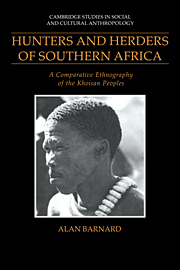Book contents
- Frontmatter
- Contents
- List of figures and maps
- List of tables
- Preface
- A note on orthography
- Part I The Khoisan peoples
- Part II A survey of Khoisan ethnography
- 3 The !Kung
- 4 The !Xõ and Eastern ≠ Hoã
- 5 The Southern Bushmen
- 6 The G/wi and G//ana of the central Kalahari
- 7 The Eastern and Northern Khoe Bushmen
- 8 The Nharo
- 9 The Cape Khoekhoe and Korana
- 10 The Nama and others
- 11 The Damara and Hai//om
- Part III Comparisons and transformations
- References
- Index
- Cambridge Studies in Social and Cultural Anthropology
6 - The G/wi and G//ana of the central Kalahari
Published online by Cambridge University Press: 05 June 2012
- Frontmatter
- Contents
- List of figures and maps
- List of tables
- Preface
- A note on orthography
- Part I The Khoisan peoples
- Part II A survey of Khoisan ethnography
- 3 The !Kung
- 4 The !Xõ and Eastern ≠ Hoã
- 5 The Southern Bushmen
- 6 The G/wi and G//ana of the central Kalahari
- 7 The Eastern and Northern Khoe Bushmen
- 8 The Nharo
- 9 The Cape Khoekhoe and Korana
- 10 The Nama and others
- 11 The Damara and Hai//om
- Part III Comparisons and transformations
- References
- Index
- Cambridge Studies in Social and Cultural Anthropology
Summary
Introduction
The G/wi and G//ana, or Central Kalahari Bushmen, are among the most isolated of Khoisan peoples. They were unknown in Dorothea Bleek's time, but speak a language of her ‘Central Bushman’ type (e.g., Bleek 1942), related more to the languages of the herding peoples than to those of the Bushman groups described thus far. As suggested in Chapter 2, this relationship is very distant, and the G/wi and G//ana have probably lived in their traditional habitat for many centuries if not millennia.
Theirs is the Central Kalahari Game Reserve (C.K.G.R.), which lies in the eastern Ghanzi District of Botswana. In The harmless people, Elizabeth Marshall Thomas (1959) describes her family's encounters with the G/wi (whom she calls the ‘Gikwe’) in the 1950s. Since then, ethnographies by Silberbauer, on the G/wi of the C.K.G.R., Tanaka and Valiente Noailles, on mixed or undifferentiated G/wi and G//ana groups in the same area, and Cashdan, on eastern G//ana and related groups in Botswana's Central District (east of the Reserve) have made them famous. Cashdan's material will be treated mainly in Chapter 7, as eastern G//ana now form part of the complex of interacting ethnic groups in the Central District. Our concern in this chapter will be with the G/wi and with those G//ana who live in close association with them in the Reserve (see map, Figure 6.1).
- Type
- Chapter
- Information
- Hunters and Herders of Southern AfricaA Comparative Ethnography of the Khoisan Peoples, pp. 98 - 116Publisher: Cambridge University PressPrint publication year: 1992



